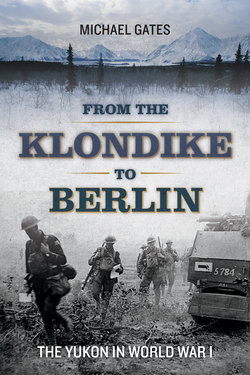Читать книгу From the Klondike to Berlin - Michael Gates - Страница 7
На сайте Литреса книга снята с продажи.
ОглавлениеPreface
From the Klondike to Berlin germinated from seeds planted unexpectedly by my wife, Kathy, who was compiling volumes of information about a Yukoner named George Black. He is more commonly referred to as Martha Black’s husband, because his wife is better known than he is. Awareness of his accomplishments as a gold rush stampeder, a lawyer and a politician is essential to understanding the evolution of this sparsely populated district in the far northwest of Canada.
Flooded with information, Kathy asked me if I would help compile material from his wartime experiences. I obliged, and my journey through time and place began.
The Yukon has had an interesting history, yet there are many untold stories. Although the First Nations had lived there for millennia, the Yukon in its modern form was born as a result of the sudden surge of humanity in search of Klondike gold. The gold rush era has been well documented in thousands of books, magazine accounts, diaries, photographs and oral histories. So too has the construction of the Alaska Highway. Yet there are other periods of the Yukon’s history that remain unexplored. The period during World War I (1914–1919) is one of them. Except in passing, there was little reference to the Yukon published during the period known as the Great War, and that is why I felt compelled to write this account.
During the Great War, Yukoners by the hundreds flocked to enlistment offices to volunteer their services in aid of king and country. The reason for doing so varied from one individual to another, but I suspect it was because of a number of factors, including patriotism, a strong sense of empire, a thirst for adventure and peer pressure. How would they have felt had they known the terrible conditions they would endure once they reached the battlefields? There is no doubt that their romantic ideals about war were shattered. Frequently, their spirits were shattered as well.
Writing about what happened to hundreds of Yukon men and women during World War I was not an easy undertaking. The graphic descriptions of trench warfare, of the inhuman conditions experienced by millions of soldiers on both sides in the trenches and No Man’s Land, were very disturbing. Accounts that I read of the constant bombardment, the rats, the rotting corpses and the stubborn determination of arrogant military commanders to shed every last drop of other men’s blood had a profound effect on me. Frequently, I had to lay them down to take a break and walk our dog in the abundant green spaces found everywhere around my northern home. Only these unspoiled wooded areas could return the calm after reading about the waste of human lives and the desolation of the battlefields of Belgium and France.
This account follows what happened to Yukoners at home and overseas, year by year, between 1914 and 1919, and later. The sources that I relied upon include the local newspapers. Alaska historian Preston Jones has noted that Alaskan newspapers during this period were a rich source of information. The Yukon’s Dawson Daily News and Whitehorse Star were too. Published letters, sent home from those overseas, were extremely valuable sources of information.
I relied upon military records to help fill in the details. Attestation papers and military service files tracked the individual courses of the volunteers of the Canadian Expeditionary Force. Records from the navy and the air force were much less abundant. The war diaries of two units that were made up primarily of Yukon enlistees were particularly useful in plotting the day-to-day activities. These units were the Yukon Motor Machine Gun Battery and the 2nd Canadian Motor Machine Gun Brigade.
Accounts of Canada’s involvement in the Great War by military historians provided me with the greater context of the war. Of these, the writings of Canadian authors/historians Tim Cook and G.W.L. Nicholson, among others, were very helpful. Specialized references about machine guns and snipers filled in details important to the story.
Some Yukon participants in the war stood out from the rest, either by what they wrote or by what others wrote about them. George and Martha Black and Howard Grestock fit into the former category. Joe Boyle and James Murdoch Christie fit into the latter. Although many displayed individual acts of bravery, these latter two men stand out for their heroic accomplishments. The efforts of the women who remained at home in the Yukon to raise funds for patriotic purposes also demanded attention.
I have woven together these disparate accounts into what I hope is a compelling and informative overview of what happened to people of the Yukon during World War I. I hope that it opens doors to the past that others will choose to enter. I do not consider myself an expert in the history of war, but I think that I share that with the hundreds of brave souls who volunteered for what they saw as a noble purpose.
